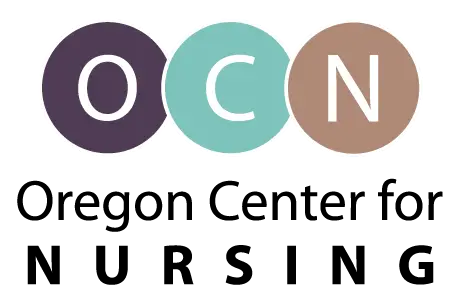
Often overlooked by the public, media, and policymakers, nurses’ roles and contributions to healthcare have been highlighted during the COVID-19 pandemic. As the pandemic shifts into yet another phase, how can we continue to recognize the contributions of Oregon’s nurses?
Recently, the Oregon Center for Nursing (OCN) launched its 20th anniversary “Recognize Nursing” campaign. A new nurse, a nurse educator, and a nurse leader shared what nurse recognition looks like and their thoughts on recognizing nursing in the future.
How nurses have been recognized
When the virus started overrunning U.S. hospitals, the public began thanking nurses for their sacrifice and often calling them heroes.
Jennifer Gentry, regional chief nursing officer for Providence Health & Services, noted that public recognition of nurses came in the form of yard signs, posters, food donations, student writing campaigns, and media statements.
That early recognition was helpful, said Gentry, MSN, RN, NEA-BC. “Nurses are sacrificing their bodies and hearts daily, and the knowledge that their community understood this and wanted to support them meant a lot.”
For others, that recognition was stressful. “Being called a hero paints you into a corner,” said Patty Barfield, an assistant professor at the Oregon Health & Science University School of Nursing on the Eastern Oregon University campus. “You cannot have a bad day. You cannot fail. But nurses are human. At the height of the pandemic, one nurse told me, ‘Don’t call me a hero. Give me some help: boots on the ground.’”
In some cases, Gentry noted that early gratitude for nursing had actually devolved into the opposite.
“I think nurses initially received more recognition, but this died down after the first year, and rather than recognition, they are often caught in the emotional crossfire of the politics of the pandemic, as well as misinformation,” Gentry said.
Jana Bitton, OCN’s executive director, warned that as society begins settling into a new normal, it may be easy to move on with our lives without recognizing just how many nurses have stepped up to confront the crises of the past two years.
“As restrictions begin to lift, it might be easy to forget the tremendous service nurses and other healthcare providers have done to keep our communities healthy,” she said.
Nurses describe meaningful recognition
Today, Gentry of Providence says that most formal recognition for nurses is done internally, including through social media posts and the DAISY Awards. She acknowledged, however, that the programs don’t always meet the need. Providence is currently undergoing a systematic review of all areas in which the organization measures outcomes to ensure appropriate recognition practices are in place, she said.
Not surprisingly, different nurses find greater value in different forms of appreciation and recognition.
April Whetsell, a recent Concordia University – St. Paul nursing program graduate, said meaningful recognition for nurses who have endured during the pandemic should include better pay and bonuses, bringing them closer to parity with traveling nurses and extra paid days off.
Barfield recently polled her faculty members, teaching nursing students in classrooms and clinical settings, on what meaningful recognition looks like to them. They indicated it includes students providing feedback confirming that the instructor listened and made a difference for them, employers recognizing their competence, and more. For them, financial competition was last on the list.
“Money is nice, but if you have no flexibility. You have no say. You have no acknowledgment of your contribution and your competence. In the end, it’s just money,” said Barfield.
Barfield’s most meaningful recognition has come from patients. Recently, Barfield, a psychiatric mental health nurse practitioner, received an email from a patient she saw ten years ago. Now 25 and with a family, the man thanked her for how she helped him as a teen.
“It was the nicest thing ever to know that you made a difference,” she said.
Employers making meaningful change
Gentry said Providence is flipping its perspective on recognizing nurses and evaluating how to acknowledge the accomplishments of its staff. For example, instead of giving nurse leaders in the medical/surgical units unrealistic turnover goals, Providence will now recognize them for training so many nurses and helping to ensure the specialty areas are fully staffed, she said.
“They are making a wonderful contribution to the organization. So we are responsible for reframing the way we think about their metrics and recognize the work they do,” she said.
Barfield urged employers to implement shared governance. This gives nurses a direct say in their work process rather than strictly top-down decision-making. Bitton emphasized meaningful recognition can only come from employers listening to their nursing staff and making real changes.
“Ask them what they need and want, and commit to system-level changes to make their work experience valuable,” Bitton said. Meaningful recognition can’t be accomplished in a two-hour meeting. It requires time, resources, commitment, and a willingness to be open to improving the workplace culture all year round.”
